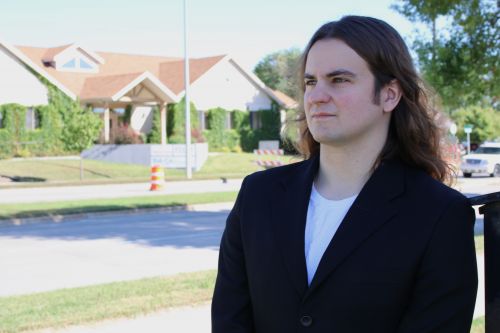News | September 24th, 2019

FARGO – Local men are keeping the trafficking of Chinese sex workers alive in the metro area. From distant Chinese villages, middle-aged women are being circulated across the world through San Gabriel, California and on to Fargo/Moorhead massage parlors.
With promises of happy endings, many of the local Asian massage parlors are offering such special services. The women rarely stay more than half a year before they’re moved to Cyprus, Paris, or back home. Mostly in their 30s, they consider their job a type of duty as they’ve failed in marriages or need to protect their families back home.
So says Keith Coates, a licensed massage therapist, who went undercover without police help four years ago to begin investigating.
At first, he didn’t want to believe so many Asian massage parlors offered sexual services, but now at 26 years old, he’s visited most of them and went as far as to befriend one massage parlor owner who gave him a glimpse into their secretive underworld.
In 2018, a total of 139,263 online advertisements selling sex were discovered by authorities in North Dakota, according to Melissa Williams, the prevention education supervisor for Rape and Abuse Crisis Center.
“The demand in our state for purchasing sex is insanely high,” Williams said. Before working with the Rape and Abuse Crisis Center she was the human trafficking navigator for eastern North Dakota.
“Human trafficking would not exist without prostitution and vice versa,” Williams said. “You might go in there thinking it’s consensual, but it may not be. Also, if you’re contributing to this community issue, ask yourself do you want to be part of a community that turns a cheek to this?
“Looking at the door to your room, imagine the next ten people who walk through that door you have to have sex with,” Williams said. “It doesn’t matter if they’re the gender you prefer, it doesn’t matter if you’re physically attracted to them, it doesn’t matter what their fetishes are, you have to have sex with the next ten people who walk through your door. Who is willingly going to choose that?”
In China, happy ending massage parlors can be found in most larger cities, sometimes sectioned off into dimly lit red light districts with a helix of colorful stripes, or fronting as hair salons with back doors leading through winding alleys to secret rooms. Most Chinese sex workers are from the countryside, speak hard-to-understand Mandarin dialects, and are focused on only one goal: money.
They also live by a set of powerful moral codes: they refuse to relinquish the obligation to return home with money; they may perform sexual favors for strangers, but they detest women who sleep around; they are highly mobile and yet become “sisters” looking out for each other, and they must be honest to other sisters, but never tell a customer the truth.
Such establishments in China thrive until a government crackdown, and then disappear, only to resurface months later.
Similar moral codes apply to Chinese sex workers in America, but here, according to Coates’s investigation, they’re part of a more muscly organization that can move them quickly when needed or wanted. They’re not paid much -- if at all -- and are working to pay off debts back home.
The first middle-aged woman who offered sexual services in 2015 raised the first human trafficking red flags for Coates, he said.
“She was wearing knee high stripper boots, skimpy clothing, and when the massage started she started stripping my underwear off when I was on the table. I was going to see what she was doing, but in the end when she did offer these services I was like, ‘Hell no.’”
Instead of ending the session, he decided to try and talk to her, he said.
“She didn’t know where she was going and she was being alternated out,” Coates said. “I thought, maybe it was just this one place, but then I went to another place and the same thing happened there.
“I was like, ‘Oh my god this is terrible,’ and this isn’t just happening at one place in Fargo.”
He gave his information to police, and waited, but two years later the parlors were still operating, he said. When he discussed his findings with YouthWorks management, they directed him to federal agents, he said. In addition to police, Coates contacted the North Dakota Board of Massage Therapy, even Homeland Security, and the Bureau of Criminal Investigation repeatedly, but there’s little they can do, Coates said.
“I waited two years for something to happen,” Coates said. “But I was still going to be patient, not going to be rash.”
Only after federal agents told him they had no case that he decided to deepen his own investigation.
“That is when I hit my breaking point,” Coates said. “During this time it went from four massage parlors to seven in Fargo/Moorhead.”
He feigned romantic interest in a woman at a massage parlor in South Fargo, he said.
“I have an idea and thought it would be crazy but I started picking up some Chinese,” Coates said. “I went to a massage parlor [name redacted] and befriended a girl. Asked her out on a date, went to the zoo, went to a couple other places, and after the third date she started opening up.”
The woman, who will remain unnamed at this time, turned out to be the owner, he said. The name Coates gave corresponds to the name of the establishment’s owner listed in North Dakota Secretary of State records.
“‘Oh my god,’ I thought, ‘you are one of the ringleaders of these places?’ But in the back of my mind I thought she was pretty evil.”
He asked her more questions. Sometimes she answered questions with text messages.
Most women are tightly watched, bussed back and forth from work to sleeping quarters. Sometimes they work, eat, and sleep in the same building. At night, all monies are pooled together, and from what he learned, workers are not paid wages.
“It seemed as if they were working off a debt,” Coates said. “And she didn’t care where they were from, she responded as callous as talking about the weather.”
One time the woman he dated thought she was getting a young recruit, but grew angry when the woman appeared much older and gave terrible massages, he said. She decided to send her back immediately.
“The only reason why she told me what she did was because she thought she and I were a thing,” Coates said. “It’s amazing the power intimacy can have.
“She’s part of something evil and hideous, so I don’t feel bad. I knew it was very risky, but it’s slavery. Probably one of the worst evils that you and I can do to each other.”
Coates also discovered that local sex workers didn’t like their jobs, but that they had children back home. They talked of failed marriages, but also of filial duty.
“They wanted to make money in America,” Coates said. “They didn’t care about American things, but they didn’t care about China either. None of them talked about China in a good way.”
Armed with new information, Coates went back to police. Two weeks went by and nothing.
“They can dodge law enforcement, and they thrive on people thinking they are a regular massage place and that their clientele won’t talk, but the one thing they don’t want, and can’t avoid is when there is a spotlight on them,” Coates said.
It was then when a police detective threatened him, Coates said. He was told that if he went public he could be implicated for soliciting prostitutes, he said.
Think of his own personal safety, the detective told him, Coates said.
“These women are trapped,” Coates said. “They get Green Cards and traffickers hold on to them.”
Linda Boyd, Coates’s mother and former longtime executive director for the Fargo-Moorhead Symphony Orchestra,city commissioner, and school board member who also ran for Fargo City Comission last year, said she doesn’t expect to solve the issue of human trafficking, but that the metro area could solve this problem locally.
“If we had one city employee who could come in and do checkups, this wouldn’t happen,” Boyd said.
“If there is a network and it certainly seems from what Keith has said, is that it’s based in China and it’s not any other specific place,” Boyd said. “It’s a subset of Chinese underground crime that is no more of an indictment against all Chinese people than any other type of specific corner of crime that we’re trying to get rid of.”
Coates isn’t on a personal mission to rid the area of Asian massage parlors, he said.
“I’m not doing this as an anti Chinese or anti Asian campaign,” Coates said. “I want this to happen so anybody who is Asian, Chinese, Thai, whatever can go into this industry without the fear of men coming in expecting sexual favors because of stereotypes.”
“You’re doing this for your profession, this is a huge black mark on your profession too,” Boyd said.
“That’s secondary,” Coates said. “I’m doing it because I hate slavery.”

Regulation
Steve Olson, a certified massage therapist for more than 33 years and former president of the American Massage Therapy Association, said regulating the massage industry straddles the fence between ethics and professionalism.
“This is a big issue,” Olson said. “There’s a strong human trafficking element in parts of the massage world, and there’s the legal aspect that state law states you can’t perform sex for money. Then there are laws governing the massage profession, which are managed by the massage therapy board. Then there is a whole other layer, a layer of professionalism, mostly to get liability coverage for their work. Those organizations have certain standards that fall into the ethics categories. They’re not laws, but by becoming a member you agree to uphold the standards.”
In North Dakota, a massage therapist must have 750 hours of training, a figure higher than the national average, Olson said.
Regulating the massage industry is complicated as such therapy is not technically medicinal, Olson said. Today, many therapists have added alternative massage-like practices such as energy healing or acupuncture, but call themselves massage therapists.
“We’re not medicine. We can create positive outcomes, but we cannot diagnose,” Olson said. “Now, people are practicing medical approaches and it’s hard to know if they’re truly certified or not. You’re using your hands in a clinical sense and it’s very difficult to test that; you can test knowledge, but not manual skill levels.”
Other barriers exist with regulatory agencies, Melissa Williams said. Prostituted people suffer from trauma bond, they’re tricked into giving day after day and when real help is offered there are language and cultural barriers when involving people from overseas. Victims are also manipulated into believing their “owners” will report them to law enforcement if they don’t cooperate, they’re lied to about laws of the land for the traffickers’ benefit, Williams said.
“When you have a mentality every day that you are always giving to people sexually, there is this constant feeling of giving and if you don’t give you don’t receive,” Williams said. “When we go in there and offer help, what is their mentality behind that?”
Many “Johns” don’t face significant charges when caught in police sting operations as well, Williams said, because the focus is on trafficked children.
“When we run stings or catch “Johns” trying to purchase sex, we end up running out of jail space,” Williams said.
Legalizing
In some areas of the United States and across the world sexual services in massage parlors are legal, but well regulated.
Massage parlors in North Dakota could be accredited in accordance with robust inspections, and those offering sexual services could become legal, tax paying entities, but such establishments would have to be differentiated from parlors offering legitimate healing, Keith Coates said.
Coates pointed to Manitoba, Canada where massage therapists are required to have 2,000 hours of training before certification. In Winnipeg there are two parlors authorized for legal sexual services, but the rest are “above board, with extremely talented therapists,” Coates said.
“It could work,” Heidi Strain, a North Dakota Massage Therapy Board member, said. “Legislators could throw that out. We would have to get it approved through legislation to get it to work, but I have not heard of anything going that way yet.”
Steve Olson said the state should look to places like Nevada and California for regulating different levels of massage parlors instead of treating them all the same.
“There’s a reality side to it,” Olson said. “California is an odd example. In their state massage is often thought about as a sexual worker profession and it’s not really a problem. The problem is about the people who want to work in a professional manner. They eventually got a certification process for people who wanted to set themselves aside from the sex therapy side.
“There’s the old question whether massage should be regulated at all. It’s like adults get to choose how they behave in the world. In my opinion the state licensing board overstepped their position for a long time when they became firmly aligned with professional associations that were pushing higher standards beyond what people learn in school.
“There are more wrinkles in this than you can imagine,” Olson said. “Cities regulate massage as anti prostitution proposals. States regulate massage with certain standards of behavior.”
Melissa Williams has seen arguments on both sides of the issue, but doesn’t agree that legalization would help end human trafficking. Not only do prostituted women face dangers from their “owners,” they are traumatized by their clients, Williams said.
“It doesn’t matter if it’s legal or not,” Williams said. “Ultimately, a lot of the trauma comes from the purchasers. Even if you got legal prostitution, you have ‘Johns’ that are disrespectful, who are violent, and a lot lot of trauma that victims come away with is based on their experience being purchased by a ‘John.’ There is a lot of trauma coming to them from what is being asked of them, what is being done to them, what is being said to them during that interaction. They’re still exposed to a traumatic experience.
“On the flip side for the small, small percentage that do this ‘willingly’ could it be safer and so-to-say better? Sure. But in my experience that is such a small percentage of those that are involved inprositution, most of them are being controlled or they’ve been groomed their entire life.
Who’s responsible?
The North Dakota Massage Therapy Board can only inspect salons that are registered within the state. They can do nothing with establishments registered elsewhere.
“This is a hot topic and has been since I’ve been on the board,” Strain said. “This is not something that North Dakota is struggling with, this is a nationwide issue. And it’s not just Asians, it’s other ethnicity groups too. We do have these illegal places that are doing sex trafficking and human trafficking in our state, and it is a problem. We have been working with law enforcement, and it takes a big process to get one shut down and I don’t understand why it takes so long.”
Ethnic groups are vulnerable to trafficking due to lack of relationships, little understanding of the culture, of language, or local customs, Emily Schwartz, director of the North Dakota Human Trafficking Taskforce, said. Some people are threatened with physical or sexual harm, or that family back home will be endangered if they don’t cooperate, or they’re lured with vague promises of indentured servitude that in many cases never ends.
“You need demand to make this work, nobody is stumbling into this,” Schwartz said. “Yes it is an issue in North Dakota, but we see people coming from all over.”
Such women should not be demonized or punished; they should be helped, Strain said. The North Dakota Massage Therapy Board is limited to what they can do, she said.
“It’s sad that the board can’t do more, it’s very frustrating for us,” Strain said. “We’re very discouraged because everybody thinks we can do something.”
The board’s power stops at state lines. If a massage therapist is not licensed appropriately, then the board reports findings to police, Strain said. They have no power to enforce rules.
“If they have a license under us we can do something, but we work strictly out of our box,” Strain said. “We have to stick to our laws and rules from North Dakota Century Code, and we are still limited as a board to what we can do. The big power is the legislators, and we are trying to make it more difficult for these people to get a license in our state.”
One Fargo massage parlor owner was registered under the North Dakota Massage Therapy Board, the rest were not found in the board’s database.
“Law enforcement do their work,” Melissa Williams said. “They’re always looking into these things, online ads, gathering information, but what it comes down to is we have to focus more on children.
“When we break down what prostitution is and take down the laugh-ey jokey stuff, who is going to choose that unless they’re being forced or in a state of their life of despeartion or no other way out, or they’be been groomed or taught to them their whole life?” Williams said. “Or again, if you’re coming from other countries, and what you’re told to do to survive... or else?”
Human trafficking through massage parlors isn’t the greatest threat in the state, Williams said. Most women are trafficked through hotels and online advertisements.
“We haven’t had a story quite like this in our community in terms of the work that we do,” Williams said. “This is a very small percentage of what we see in North Dakota. I don’t want it to be looked at like every Chinese parlor is the issue, anyone can be trafficked and trafficked out of massage parlors.”
Market-driven criminal industry
More than 40 million people are trafficked around the world every year, and 10 million of that number are children, according to research from Unseen, an organization that fights against human trafficking in Fargo reported.
More than 9,000 illicit massage parlors with annual revenue of $2.5 billion are open for business in America, according to the Polaris Project, a national organization that fights human trafficking.
Most women working in illicit massage parlors are mothers in their 30s to late 50s, are from China or South Korea, are under extreme financial pressure, speak little English, and are recruited through fraudulent ads that misrepresent pay and hide the sexual nature of the job, the Polaris Project reported. Once trapped, they work excessive hours and are paid less than the minimum wage or nothing, and told such practices are normal.
If they try to fight back, they’re threatened with arrest, deportation, or threats from back home.
Trafficked human beings are enslaved to enrich a “master,” or are held against their will to pleasure primarily men. Billions of dollars are generated every year by forcing women, children, and men into forced labor or forced marriages, according to the National Human Trafficking Hotline.
“Human trafficking is a market-driven criminal industry that is based on the principles of supply and demand, like drugs or arms trafficking,” the National Human Trafficking Hotline reported. “Many factors make children and adults vulnerable to human trafficking. However, human trafficking does not exist solely because many people are vulnerable to exploitation. Instead, human trafficking is fueled by a demand for cheap labor, services, and for commercial sex.”
Although Coates has reported his information to police, he’s been disappointed with their response, he said. One detective threatened him not to go public with the information, Coates said.
“It is a very intricate investigation as it is still an ongoing investigation,” Jessica Schindeldecker, Crime Prevention and Public Information Officer for the Fargo Police Department, said. “Any talk of it could hinder the actual investigation and further prosecution. It’s very complex, and these things take time. It would be a disservice to the Fargo Police Department and would not help to publish names or anything about this.”
Holly Scott, the public information officer for Fargo Cass County Public Health said all investigations into massage parlors would begin with the North Dakota Board of Massage Therapy.
“We don’t regulate, license, or inspect massage therapy businesses locally,” Scott said.
For those men who believe they’re addicted to sex, the state has a Demand Reduction Program, which “Johns” caught in sting operations or anyone who believes they’re suffering from the addiction can attend, Melissa Williams said.
Danger
Heidi Strain had not heard about Coates’s investigation, she said, but she’s worried for him.
“There’s a lot of money there and many people just look away and think it’s no big deal, but it is a big deal, they’re trafficking people,” Strain said. “They’re little circles, but under bigger umbrellas. Once they know they’re under investigation, they move, and then it’s hard for police to catch up.
“It can be a very dangerous thing to do. Don’t go in there alone, don’t go in at all, send police in there, because it’s not just a single person, these are big – like the mafia – like huge.”
Getting involved in undercover investigations is dangerous, Melissa Williams said. The state needs more eyes on its massage parlors, and better staffing to understand the languages, cultures, and fears trafficked women posses, she said.
“We need more eyes on them,” Williams said. “It’s dangerous and there is a good chance they could be interfering with law enforcement. There is also a concern that victims won’t speak up, they might shut down the parlor, or they might just bump over to the next state or next country and do it all over again.”
Although Coates was warned by police, he understands the dangers he may be putting himself in by going public with his information, he said.
“I’ve made peace with everything,” Coates said. “Some things are bigger than myself. This is slavery.”
July 15th 2025
July 7th 2025
June 9th 2025
April 30th 2025
April 24th 2025



__293px-wide.jpg)
__293px-wide.jpg)
